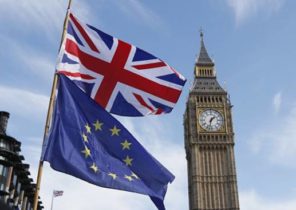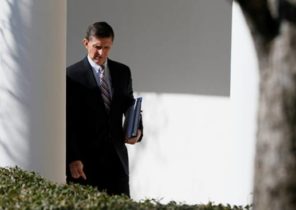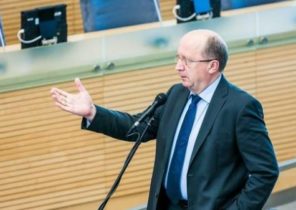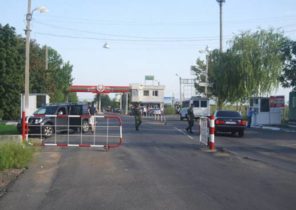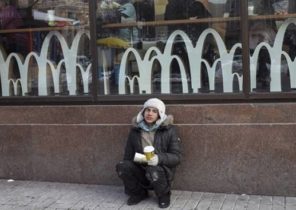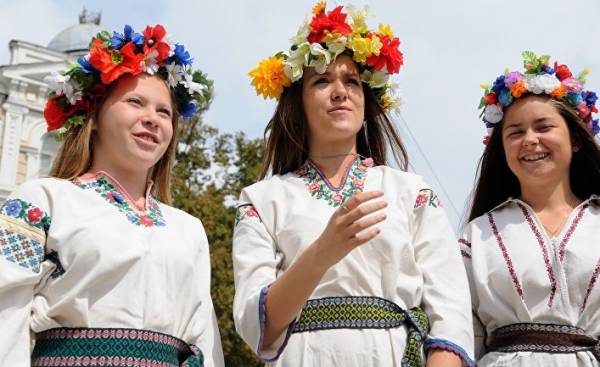
Debate about how it’s “Ukraine” or “Ukraine”, sometimes similar to a real war. For some debaters it is a serious issue, a litmus test on “Imperial.” Immediately after the Soviet Union collapsed, the former Soviet republics (and now — free countries) began to demand from Russia to change the rules of spelling and pronunciation of a number of geographical names: Alma-ATA should be pronounced “Almaty”, Belarus — “Belarus”, Tallinn demanded to add to the end of the second “n”. At the same time Ukraine has introduced a rule not even in the name of the country, and on the pretext that she should be written and pronounced, not “the Ukraine” and “Ukraine”. Argument: “in” means in the state, and “on” in a certain area, without national borders: in the Volyn region, on the don, on the Volga, Kamchatka.
Opponents objected: but we’re talking “in Siberia” (although it is not a state), “cube” (although it is, on the contrary, the state). The other side replied, “on” is when talking about the island: in Madagascar, Crete, Mallorca. Opponents objected to anything like that in Australia (island) in New Zealand, in Japan.
That is, for every argument there is a counterargument. Will always be “in the Crimea”, but “Caucasus”. How can that be? I decided to gather opinions. First called the Kharkiv cultural historian, doctor of philosophical Sciences, Professor Lidia Starodubtseva:
Lydia Starodubtseva: today coexist Because both the norm of speaking, the question “how to?”, it seems to me, should be reformulated as follows: how is preferable? It is always a matter of choice. And people living in Ukraine, the choice already made in 1993, when, at the request of the Ukrainian government, we decided to change this speaking. And this choice was political, because talk, using the preposition “to” is formally to assume that this is just the territory of Ukraine as the outskirts, you can come to the outskirts, you can come into the territory. And to use the preposition “in” is to respect the sovereignty of the state. You can come to Ukraine, as well as you can come to Czech Republic, to Germany, to Sweden, to Russia, to the United States. And the use of the preposition “in” constitutes the frontier of state sovereignty. Therefore, it is not a question of linguistic norms, not a matter of spelling and pronunciation, it is a question of political choice.
Radio Liberty: so thus the choice was made in 1993 at the suggestion, the request of the Ukrainian government. So, until 1993 this issue in the Ukrainian language, the Ukrainian language did not get up? Intellectuals, educated people and people this issue not discussed?
— The problem is, I would say, was in a latent state, so it is not recognized as a problem. And even in the mobility and transparency rules of the Russian language was some flexible rules, which changed it’s pronunciation. All known examples from Pushkin, “Poltava”: “…and brought the war in Ukraine.” Gogol we find the use of the preposition “in”: “there is no order in Ukraine.” And Tolstoy Bagration, incidentally, completed his army “Ukraine” not “the Ukraine”. And even Chekhov: “so, I’m in Ukraine…” It is more than known examples, which say that in “Russian” the Russian language the prepositions “in” and “on” are equivalent. In Ukraine, of course, this subject was discussed, but I would say that the pretext was a pretext for conflict only in the era of the establishment of Ukrainian independence, only after 1993.
— So, the decision was government, it was political and you can say that it was imposed on society?
— I think that there has been an escalation of two opposing movements. On the one hand, the movement from below, from some Patriotic sentiment, the idea is to strengthen, to constitute the border of the self-realization of the area as the state of the self as a political nation. This movement from the bottom up. Another is the movement from top to bottom. It is, indeed, a kind of order: but let’s say that we will respect ourselves more if we know that we are a sovereign state and not just the outskirts of Russia, and then we’ll have some independence. And in philosophical terminology — self. We will have self. Kantian “thing in itself” presupposes that wonderful preposition “in”. We in themselves. So, two counter-movements. I don’t think it was purely political, empty, frustrated gesture, some empty ideological gesture. No, there was a meeting.
— Lydia Vladimirovna, but isn’t it strange that other people, non-Russian people decide what they should sound like prepositions in another language or in another language, in Russian language? Did Ukraine do not care how they speak Russian? Don’t they also to say it not to solve? Isn’t there some original, fundamental, even, frankly, a bit of comic paradox?
— Of course, our life is not devoid of absurdity, a surreal pathos, and, of course, it’s funny. But let’s consider the fact that many people in Ukraine are Russian-speaking, including I, the Russian-speaking Ukrainian patriot living in Kharkov, a large part of our city is Russian-speaking, and is not only an external solution. There are two language — “Russian Russian” and “Russian Ukrainian”. And for me, living in Kharkov, the very utterance of the preposition “in” or “on” is a marker of identity, or more simply, a hallmark not just of political correctness, and the sign that delineates your position in the political space of modern Ukraine. If you hear “Ukraine”, so we are in the midst of Ukrainian patriots, if in our midst someone says “the Ukraine”, even I involuntarily shudder, I think that for me is my political opponent, the person who wants to build here the Kharkov national Republic or people’s Republic, the likes of Putin. Here, oddly enough, the conflict of prepositions becomes a pretext for conflict.
— You are not ready to allow, that in the Russian language there are certain laws, muscular acoustic, the organ of speech, as a language, when from the human mouth emitted sounds, convenient for the speaker, without a second thought, without any political motive, without trying to offend someone, to hurt or offend? For example, I say “the Ukraine”, not thinking so, thus I offend someone or not, because I do not think either the preposition “to” or any other pretext of carrying some kind of insult. The whole discussion, which began in 1993, more precisely, who on the political level, for me it was quite new, and, frankly, sounds wild because it is spontaneous, perceived since childhood pronunciation of certain forms, and no additional values, my language, my brain, my desire, my political beliefs have nothing to do intuitive articulation and combination of those or other sounds. You do not suppose that you can be against Putin, but to say “the Ukraine”?
I’m not a follower and not an apologist for the teachings of Humboldt, but I know that all humboldtians argue that linguistic norms is movable education and that language is a process, not a static system of rules, and is infinitely alive, vital, natural process. And just like you, in my childhood I was told that I live “in the Ukraine”, and, perhaps, to 2013 my choice, a free choice to speak “in Ukraine” and “Ukraine” was also, politically, ideologically, and emotionally neutral. But after the outbreak of war in the East of Ukraine I think the choice of preposition cannot be ethically neutral, the choice of preposition now means more than just adherence to one or another since childhood perceived linguistic norm. This is a political statement, I would say.
“In” or “on” Ukraine? Question the poet, novelist, translator, essayist Yuri Andrukhovych, who lives in Ivano-Frankivsk:
Yuri Andrukhovych: From my point of view, not only mine, because this is the norm is simply grammatical, it is necessary to speak “in Ukraine” and Russian language took the form, in the sense that in Ukraine it is the norm for the Russian-language media too. We have a Ukrainian editor will correct the text written in the Russian language, the form “the Ukraine” to “Ukraine”. In General, of course, a trifle, but a trifle where there is a significant thing — a certain subjectivity. That is, becoming a sovereign masters of their destiny, their country, its history, we have the right to decide what excuse to use the name of their country. Some irritated reaction of Ukrainians to the form used in Russia is not that other, as a response to the intolerance of many Russians to the form “in Ukraine”. Even in my personal experience, there are episodes when there was a time that I was visiting friends in Moscow in the late 90’s, and tied some completely meaningless linguistic battle: why, how dare, mangling the language to speak “in Ukraine”?! And I remember those dramatic cries that “I expression “in Ukraine” through the throat will not climb” and so on. But I don’t attribute this in any case with a pattern that Imperial thinking.
I think that is much more derogatory would be the definition of Ruthenia. But do not say “the Ukraine”, they say “in the Ukraine”. That is not necessarily a form of “on” and “in” marks the attitude of the Empire towards its colonies, and it is clear that even in the geographical sense of the use of these prepositions lack any pattern. Well, consider that if we say “on”, then we are talking about an island — “in Cuba” or “Madagascar”. But at the same time we say “New Zealand” or “in Ireland”, although it would seem, also of the island. On the other hand, there is the base “in Russia” — the only way it is used in the Russian language and in Ukrainian. At the same time, if we do this Russia had something to clarify, it says “Kievan Rus'”, not “Kievan Rus”. I think it is just the Russians too painfully reacted to this form “in Ukraine” as a symbol of sovereignty and that we are separated. And in my opinion, this is one of the linguistic confusion, which is hard enough to get to some of the motivations why “to” why not “in”, not Vice versa.
So, a double-edged prepositions. What can you say writer Oksana Zabuzhko, the very people acute?
Oksana Zabuzhko: I hope nobody will be offended if you say that I do not care what they say — “to Ukraine” or “Ukraine” — as long as Russian troops are in my territory. It is a question not of paramount importance. Although specific marker of Imperial that’s “on” in Ukraine, especially for Russian-speaking Ukrainians, is perceived. How very elegantly formulated a foreigner studying Russian language, then the difference is clear: tourists are coming for a visit “to Ukraine” and attacking “Ukraine”. And it’s very clever wording that explains a lot. But for me personally it does not cause such irritation, I’m not a native speaker of Russian language, and not my place to show Russians how to use their language. What I can do when I hear “in” or “on”, but this irritation, as, for example, cause so far, since the days of the cold war, lost in English the Ukraine, this is the definite article, marking not the country, and the territory they control. That is, Yes, it is definitely perceived in bayonets. And “in” or “on” now for the Ukrainian ear — not the most bleeding wound, there are problems scarier and more important. I mean that if, for example, right now I’m listening to some comrades of the Russian General staff will decide that the Ukrainians will immediately soften and flow, if they are Russian propaganda write through “in Ukraine”, then no, I will not soften and flow, though a particular token of Imperial is “the Ukraine” is, of course, remains.
And what about the Russian side? Not the staff, of course, and linguistics. I called the Moscow linguist, doctor of Philology Maxim Krongauz. I was particularly attracted by the fact that Professor Krongauz, head of laboratory of linguistic conflict studies at the Higher school of economy:
Maxim krongauz: Discussion about the prepositions “on” and “in” to the word “Ukraine” has been ongoing for quite a few years, and it seems that there is no single solution in the near future will not work. But we must make one more important point before discussing this topic. Everything about the prepositions “on” and “in” also applies to the prepositions “with” and “from”. If we choose the preposition “to”, we have to choose the preposition “with”, and if we choose the preposition “in”, we have to choose the preposition “from” Ukraine. Now — the argument from both sides. The argument from the Ukrainian side, first of all, this. Ukraine is an independent state, and there is a rule that States we use the preposition “in”: England, USA, Africa and so on.
The arguments of the Russian side. The answer is something like this. We used to use the preposition “on”, any political implication of it is not entail, it is not about the fact that Ukraine is not an independent state, and on language habit. The language habit for the language and for native speaker — a very important thing. In addition, the preposition “on” tells a huge number of people that are not involved in the ideological conflict. In addition, in any rule there are exceptions, and exceptions are the most loved and important geographical concepts. And in this case it is absolutely obvious that Ukraine for Russia is extremely important and close, and that’s why the exception is possible here.
If you look at the situation more broadly, the argument is not so important, but the situation that has developed. And it is that in the Ukrainian version of the Russian language pretext “to” have already won the preposition “to”, and the people of Ukraine often take the preposition “on” with the offense, dissatisfied with this excuse, and fighting with him. Faced, on the one hand, the language and habit, on the other hand, political correctness. I think in this situation it is most natural when we are talking with the people of Ukraine, to use the excuse that they are not offended, that is, the preposition “in”. And whether it is necessary to change the preposition in the Russian language, when we speak of the house when published texts about this? Here the motivation is, of course, weaker, and she is the weaker, the weaker position of the Russian language in the Ukrainian state. Here, I think, the lower the status of the language, the less opportunities of Ukraine affect Russian language. For example, one can hardly imagine a situation when Ukrainians will require some changes in the English language or in other distant languages.
Politeness, tact — great advice. Do not hurt the interlocutor. And very interesting observation about the weakness of the position of the Russian language in the Ukraine. By the way, the British why-that do not require the French to stop to say Londres instead of London, the Italians do not break off diplomatic relations with the Czech Republic for the word of Benatky (this is Venice), and so on. Now with me is my colleague Igor Pomerantsev:
Radio Liberty: Igor Yakovlevich, you, of course, Ukrainian., but you and Russian poet. As you wiggle in this case, get out of the difficult situation? It is necessary to speak “in Ukraine” or “Ukraine”? What is your choice?
Igor Pomerantsev: I don’t Have the sense to get out, I’m not just Ukrainian and redobandire, I grew up in Chernivtsi, therefore, quite natural for me to think about a small country as part of a large.
— And as mentioned in Chernivtsi then?
— Then officially was some prepositions, and informally. In Chernivtsi said not only Ukrainian, they spoke on the Hutsul and Bukovyna, the Carpathian language. It is one language, but nevertheless are different branches. I now do not recall, but for me the transition to the “in” was quite natural. I’m not just as you called me,., I…
— So the people you call Ukrainian.
— I’m a philologist by training, so I’d like to start from afar, from a distance, literally, from the geographical distant, not from Bukovina, Ukraine. I had such a wonderful island of Formosa. The island remained, and the name is gone. Why the name went to, and why a beautiful island? It’s a Portuguese word. Formosa became the Formosa, through the Portuguese sailors, and the word meant “beautiful”, “beautiful”. However, now all the English-speaking media and, by the way (and this is an indicator of what to call this or that country), the largest news Agency the Associated Press or Reuters, only write “Taiwan”. The word “Formosa” is gone. Or in the English language (I return to Ukraine), 30 years ago against Ukraine, used the definite article — The Ukraine. Why? Because Ukraine belonged to the area. This region. A region can be called the definite article. But since 1993, news agencies and the largest press of America and England forgot about this article, because there was an independent state. I cite examples of flexibility.
And as it is now called in English?
— Ukraine without definite article, as befits an independent state. So, you see, Ukraine are connected not only problems in the Russian language, but this problem was promptly solved. I would do if I were a real scholar, a new discipline of Philology was founded — the adventures of words. For example, the journey of the word “Negro” in English. This is a Latin origin word, but for political and politically correct reasons, since the mid 70-ies of the word was not used, and the society of American concessions to the blacks and changed “Negro” to “black”, and then another, took a step forward, and now the former black, former blacks call themselves African Americans, and the whole country calls them African Americans — the way they want. And this is not an isolated precedent.
In Russia there is a precedent with the word “Jew”. Catherine II, at the request of the Belarusian Shklov Jewish community (such was and is the city Shklovsk) is 1787 refused in official documents use the word “Jew”. Therefore, such contracts possible. Against the horn, only when it is a kind of metonymy for something else, metonymy of the war, for example. And I now return to the theme of war, because we are the witnesses of the war of the prepositions “with” and “in” in relation to Ukraine. “On” is on the offensive, retreating… But then I remember yet another war, this is a Greek parody, the poem “War of mice and frogs”. At first glance, a war between “in” and “on” recalls this travesty, meanwhile, behind the cloak had shed blood, liters of blood. That is, this war has become real. As for this war, by the way, in the end defeated the frogs, though at first there came the mouse. And I even remembered the poetry of the Japanese, was such a wonderful classic, Japanese poet Issa, he has such a haiku:
Hey, don’t give in,
Skinny frog!
Issa for you.
So, in Ukrainian “war of mice and frogs” sounds like “Viyna toads I Misha,” and I wrote a parody of Issa, and it sounds like this:
Hey, don’t give in,
Skinny toad!
Igor for you.
These are the thoughts of Igor Pomerantsev. But is there a way out? Russian edition of Radio Liberty adheres to such a practice: we live in every guest says as he thinks fit, but on behalf of the editor (say on the news) we say “on Ukraine”. Despite the fact that all our listeners know about our sympathy for Ukrainian freedom. And I think that our solution is very similar to one dialogue that took place ninety years ago in Paris. The poet Vladislav Khodasevich (Muscovite by birth) read as poems of the poet Dovid Knut (who came from Chisinau): “So don’t speak the language,” said Khodasevich. “Where do you say?” — sarcastically asked the Whip.
In General, long live the great, mighty and free Russian language entitling you to endless options and nagged. Still, he was able to reconcile…

